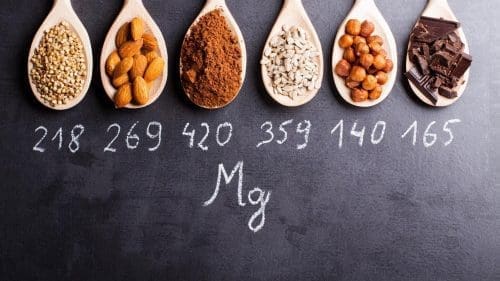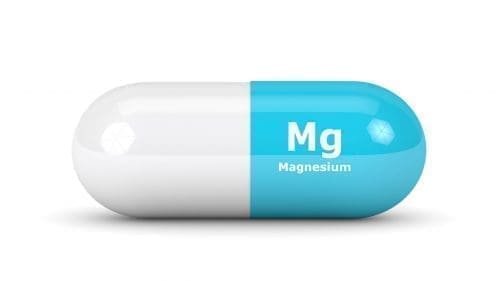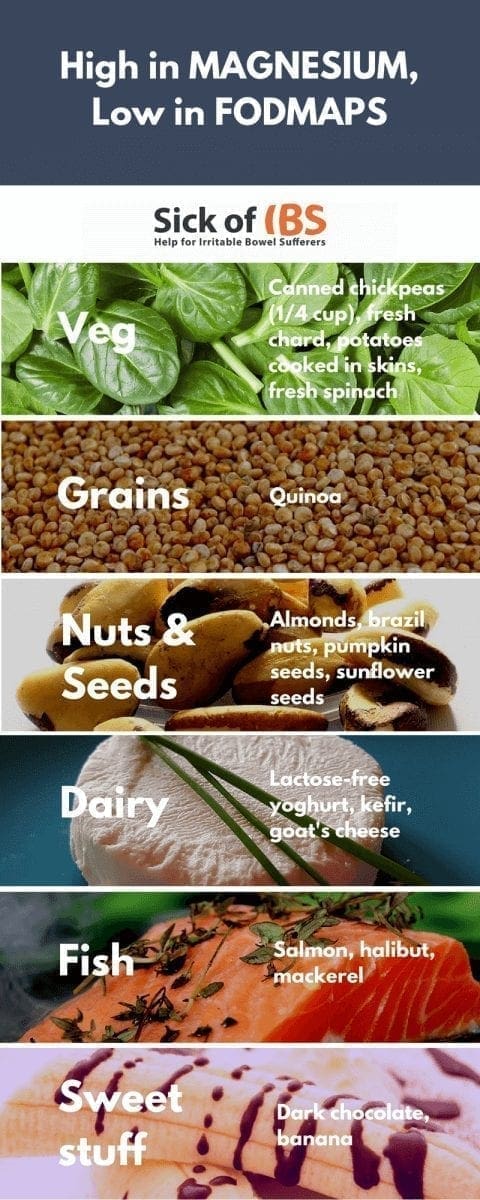
Did you know that constipation with IBS and magnesium levels can be related?
According to the NIH office of dietary supplements, “magnesium is a cofactor in more than 300 enzyme systems that regulate diverse biochemical reactions in the body. These include protein synthesis, muscle and nerve function, blood glucose control, and blood pressure regulation”.
Muscles and nerves are mobilised to push food through the digestive tract correctly. This is why constipation and magnesium can be closely related. Low magnesium could be slowing down this process and causing you typical IBS-C symptoms, as well as feeling tired.
The average adult should be consuming around 420 mg for men and 320 mg for women. Many of us are consuming less. We can be losing magnesium through poor digestion. And this can be affecting our general health and how we feel in general.
Feeling constipated, tired, irritable or negative?

You may have already realised that stress and tension often aggravate IBS-C symptoms. When you are stressed, magnesium is lost from the body into your urine.
Maybe you are already having problems with digestion, thus reducing the amount you absorb.
If you then lose what you do take into your system, you could find yourself with the symptoms of low magnesium levels. These can include feeling tired, irritable, negative and above all constipated.
What you can do to boost your magnesium levels:

Here are some general ways to boost your magnesium intake.
Do ask your doctor or nutritionist for advice concerning your specific state of health.
1) Eat more magnesium-rich foods (ideally low in Fodmaps)
You can improve your magnesium levels is by increasing the amount your diet provides. This way you will have a better chance of absorbing more into your body – even if your digestion is not optimum.
Eating a few nuts (if you digest them) is an easy way to up magnesium consumption.
I have compiled this list of foods that are generally well tolerated by IBS sufferers to get you started. If you can digest avocado, that’s a good source of magnesium too!
Prefer organic, fresh products without preservatives where possible. For more detailed information on serving sizes and levels of magnesium content, look here.
2) Have a Banana brew
This “banana brew” is naturally rich in magnesium. A French doctor, Michaël BREUS, prescribes this brew to his patients to boost magnesium levels and reduce constipation.
For some people, the fibre in bananas constipates them further. However, a large part of the magnesium is found in the skin of the banana. So it makes sense to use the skins instead.
For 2 servings:
First, take an organic banana. Leave the skin on it and wash it well.
Cut off the two ends, and cut the banana in two, still with the skin on.
Then put it in a saucepan with about 3 cups (750ml) of boiling water. Leave to cook gently for about 45 minutes (the banana goes brown).
Finally, take the banana out, and drink the liquid.
You can add some cinnamon and cane sugar or stevia to taste. Cinnamon gives a great taste, but also is known for its anti-inflammatory properties that can provide some relief for indigestion, flatulence, heartburn, nausea and stomach cramps.
You can drink this as necessary, every day if you need to until you feel improvement. If you have IBS-C and magnesium deficiency you may find it takes several days before you see results.
You can, of course, also eat the banana too if you want to!
This recipe and photo are reproduced with the kind permission of Marie Kelenn (www.nourriture-sante.com).
3) Take a magnesium supplement

I always prefer natural remedies. However, another option is to take an over-the-counter magnesium supplement. On IBS forums many IBS-C sufferers find magnesium citrate very effective. I must say that I have not used this solution myself.
Magnesium citrate may not be recommended if you have specific medical conditions or if you take medication. So do ask your doctor and/or Chemist for advice.
The Mayo Clinic warns that “the magnesium in supplements (as opposed to magnesium present in foods) can interact with some types of antibiotics and other medicines“. It also guards against taking large doses of supplements as they “can cause nausea, abdominal cramping and diarrhea”.
4) A relaxing way to deal with constipation and magnesium

What a relaxing way to deal with constipation and magnesium! Taking a bath with Epsom salts.
Epsom salt is magnesium sulfate, a chemical compound made up of magnesium, sulfur, and oxygen.
The advantage of Epsom Salt is that you don’t have to digest the magnesium. It is made up of magnesium sulfate. So you can sprinkle some into a bath and absorb the magnesium through your skin (topically).
If you can, take a relaxing bath once a week. Just pour in 2 cups to the running water. To get full benefits,stay in the bath at least 15-20 minutes.
Where can I buy Epsom Salt?
You can usually buy medical grade Epsom salt from your Chemist. I buy the UK brand Westlab Epsom Salt online, supplied by Blue Herbs. I’m personally very satisfied with the product and their service.
Constipation and stress
If you know that stress is a trigger for your IBS symptoms, this article explains the roots of stress and how you can reduce stress.
9

